#business in thailand
Text
Buying a Property in Thailand
Foreigners can't directly own land in Thailand, but condo ownership (freehold or leasehold) is an option. Alternatively, consider a Thai company for land ownership or lease houses/villas. Due diligence with a lawyer is key. Partner with professionals for a smooth purchase.
Thailand's allure extends far beyond its captivating beaches and vibrant culture. For many, it beckons as a potential haven for retirement or a tropical escape with investment opportunities. But for foreigners, navigating property ownership in Thailand can seem complex. This guide sheds light on the options available and essential considerations for your Thai property purchase.
Land Ownership Restrictions: Understanding the Landscape
Thai law prohibits foreigners from directly owning land. However, this doesn't preclude foreign ownership of property altogether. Here's where the options unfold:
Condominiums: The most common route for foreigners is purchasing a condominium unit. Foreigners can own freehold titles up to a 49% quota within a development, with the remaining 51% typically held by Thai nationals. Leasehold options are also available, offering usage rights for an extended period with potential renewal options.
Thai Company Formation: For those seeking land ownership (though not the land itself), establishing a Thai company presents a possibility. With a majority of shares held by Thai citizens, the company can then purchase the property, granting you indirect control through your company ownership. This option comes with additional complexities and professional guidance is highly recommended.
Leases for Houses and Villas: While not ownership, leasehold agreements allow foreigners to rent houses or villas with land for extended periods, typically 30 years with potential renewals. This can be a suitable option for those seeking a landed property experience.
Navigating the Process: Steps to Success
Once you've chosen your property type, due diligence is paramount. Enlist a reputable lawyer to verify land titles, check for encumbrances, and ensure compliance with regulations. Understanding the ongoing costs associated with property ownership, such as maintenance fees and taxes, is also crucial.
Embrace Professional Help and Enjoy the Journey
Purchasing property in Thailand can be a rewarding experience. By partnering with a trustworthy real estate agent and legal professional, you can navigate the process with confidence. Remember, thorough research, a clear understanding of the legalities, and professional guidance will pave the way for realizing your Thai property dream.
Visit our website for more information: https://www.samuisolicitors.com/
0 notes
Text
Representative Office in Thailand
Thailand's allure for foreign businesses is undeniable. But before diving in, representative offices (ROs) offer a springboard for market entry.
ROs are non-trading entities that connect foreign companies to the Thai market. Unlike revenue-generating branch offices, ROs focus on market research, partner identification, and head office promotion.
Benefits of ROs:
Market Testing: Test the waters and assess market fit before committing to a larger investment.
Relationship Building: Network with potential customers and partners to lay the groundwork for future ventures.
Limited Liability: ROs are exempt from corporate income tax since they don't generate income.
Considerations:
Restrictions: ROs are limited to non-revenue generating activities like market research and promotion.
Costs: There's a minimum capital requirement to establish an RO.
Work Permits: ROs can only sponsor a limited number of foreign staff.
ROs are a strategic first step for companies seeking an efficient entry into Thailand's market. Consulting legal professionals ensures you comply with regulations and choose the right business structure for your goals.
Visit our website for more information: https://www.phuket-solicitor.com/representative-office-in-thailand/
#representative office in thailand#corporate#business in thailand#corporate in thailand#lawyers#attorneys#lawyers in thailand
0 notes
Text
#thailand#ex pat business#business ownership thailand#business in thailand#own a bar in thailand#ownership#ex-pat business#running a bar in thailand
1 note
·
View note
Text
Thai Limited Company Registration
There are numerous factors you should be aware of regarding the registration of Thai limited companies. This article will cover other conditions you must meet in addition to whether your company is Thai-owned or foreign-owned. The legal and tax requirements for establishing a company in Thailand are another thing you'll study. Naturally, there are several things that you must remember. Some of the most crucial considerations when establishing a new business in Thailand are listed below.
Thai Limited Company Thai Majority
A Thai Limited Company is a business that has at least three owners and one or more directors in charge of running it. According to Thai law, any group of three or more people can establish a limited company, although shareholders have very limited influence over how the company is run. Directors have obligations to the corporation and the shareholders under fiduciary law. The business has its own tax and corporation law statutes. Once registered, it will have Thai and foreign nationals as shareholders.
A Thai Limited Company is a distinct legal entity that typically operates for a long time, until its owners pass away or are no longer able to run the business. Thai Limited Companies are a non-dissolvable investment option that are frequently chosen above other types of investment in the nation. Directors in their branch offices, where day-to-day management is carried out, are chosen by the shareholders. This enables them to make significant investments while maintaining their financial stability.
Thai Limited Company Foreign-Owned
You might be asking how to set up a Thai Limited Company if you're thinking about launching a business in Thailand. It has a rather straightforward framework that lets you carry out a wide range of activities. A minimum of three shareholders are required to own a Thai Limited company. Each shareholder's liability is capped at the par value of their shares, and a board of directors oversees them. Some of the procedures for creating a Thai Limited Company are listed below.
Choosing the type of business you want to start is the first step. Thai Limited Companies are the most common corporate structure in Thailand for foreign-owned companies. These businesses are the best for a number of factors, including how simple it is for them to begin up and support foreign work permits. The BOI Company, which the Thai government is actively promoting, is the next most well-known company. These businesses provide significant financial incentives to foreign investors who opt to create them.
Thai Limited Company Registration Requirements
While registering a company in Thailand, there are a few things that foreign investors need to know to get a successful result. First, the name of the company must be unique and not match an existing company. Also, the company name cannot contain any words that could cause confusion for those who do not speak Thai. There are three main steps for Thai company registration. These steps are listed below. If you follow these steps, you can register your company with ease in Thailand.
When forming a company, you must have at least three shareholders and a minimum share value of 5 Baht. After registering your company, you can conduct business in other provinces as long as you have a Bangkok address. Once your company is registered, you can present your products to clients without permission or an office. You can also have an internet banking account for your company and a TOKEN device. You must present these items to the Revenue Department to register your company in Thailand.
Visit our website: https://thai-attorney.com/thai-limited-company-registration/
0 notes
Text
How to Start a Business in Thailand
Thailand is a great place to start a business, with its growing economy, strategic location, and business-friendly policies. In this article, we will discuss the steps you need to take to start a business in Thailand.
Choose a Business Structure: The first step is to choose a business structure that suits your needs. You can choose from a limited company, a partnership, a sole proprietorship, or a branch office.
Register Your Business: Once you have chosen your business structure, you need to register your business with the Department of Business Development. You will need to provide various documents such as your passport, your business plan, and your company's articles of association.
Apply for a Tax ID: You will also need to apply for a tax ID from the Revenue Department. This will allow you to pay taxes and comply with Thai tax laws.
Obtain Licenses and Permits: Depending on the type of business you are starting, you may need to obtain licenses and permits from various government agencies. For example, if you are starting a restaurant, you will need to obtain a food service license from the Ministry of Public Health.
Open a Bank Account: You will need to open a Thai bank account for your business. This will allow you to conduct business transactions and comply with Thai financial laws.
Hire Employees: If you are planning to hire employees, you will need to comply with Thai labor laws and regulations. You will need to register your employees with the Social Security Office and provide them with benefits such as health insurance.
Obtain Visas and Work Permits: If you are a foreigner starting a business in Thailand, you will need to obtain the necessary visas and work permits to legally work and live in the country.
Starting a business in Thailand can be a rewarding experience, but it requires careful planning and compliance with Thai laws and regulations. By following these steps, you can start your business on the right foot and contribute to Thailand's growing economy.
Visit our website: https://www.thaiworkpermit.com/how-to-start-a-business-in-thailand.html
0 notes
Text
BL 2023 - BEST KISSES
Not from Thailand... but still GREAT
Best kiss of 2023:

Why R U? Korea
The backpack drop. This actually won best kiss of the year over all from me. A big surprise upset from Korea.
This pair in general did v good!


Best slow burn FINALLY kiss:

Our Dating Sim
Best Queer AF kiss:

The New Employee
Best high heat kinky fuckers kisses:


My Personal Weatherman
Best hella thirsty kiss:

I Cannot Reach You
Best kiss from a BL side pair:

Mr Cinderella 2
Best general making out and sex scenes:

Kiseki Dear to Me
Best missing umbrella kiss:

also My Personal Weatherman
Best At Kissing ALL THE BOYS:

BV in Vian
Most notable moment in KBL: I'm not sure you actually kissed but it was really significant:

Bump Up Business (two idols from the same 4th gen group, OnlyOneOf)
Only non-Thai BLs that completely ended in 2023 are included in this list.
(source)
#best bl kisses of 2023#bl 2023#best of list#best kisses#everyone by Thailand#they compete in their own category#Korean BL#the new employee#My Personal Weatherman#Japanese BL#I Cannot Reach You#Mr Cinderella 2#vietnamese bl#Kiseki Dear to Me#taiwanaese bl#Bump Up Business#OnlyOneOf
198 notes
·
View notes
Text



where is the commentary from the boat riders overhearing this confession
#cherry magic#cherry magic th#cherry magic thailand#beck liveblogs#the boat riders all trying to mind their business after a long day at work and overhearing a lovers quarrel
168 notes
·
View notes
Text
Rich guy in an asian drama: I have no interest in love or romance and I think dating is a waste of time.
Plucky ordinary girl: You suck, your family and friends suck, you make me miserable and I’m in love with another guy.
Rich guy:

#what's wrong with secretary kim#business proposal#f4:thailand#asian dramas#kdramas#this is probably an oversimplification#but also#is it?#but god this trope gets me every time#give me a guy who can get anything he wants except the love of a good woman
675 notes
·
View notes
Text
MileApo and the rise of Thai soft power
Mile and Apo talking about the Thai period film at the Vogue Thailand Gala on 2022/9/21
I've been meaning to sit down and write about this for a while now, ever since I saw the pattern of Mile and Apo injecting it into their talking points about the 2023 historical film, but it's taken some an effort to actually lay it out. Hopefully the time I sat with it will make the it a more insightful, rich reading experience.
Disclaimers:
(1) I have no formal experience in international relations aside from reading and watching the news, but my strong point is research. Folks with a more formal backgrounds in policsci or IR are welcome to add their input!
(2) Comments about policies or political actions of nations, whether positive, neutral or negative, are not meant to reflect on private individuals of the nationality, even those with a notable amount of social-cultural capital. Private individuals, despite their positions of social influence, most often have little to no individual influence on a policy level**.
So without further ado:
What is soft power? (aka soft power for dummies)
Joseph Nye, a then-Harvard professor, coined the term soft power in the 1980s/early 90s. He described it as:
“A country’s ability to influence the preferences and behaviors of various actors in the international arena (states, corporations, communities, publics etc.) through attraction or persuasion rather than coercion.”
In his book Bound to Lead, Nye established that three prongs of a country's soft power were its culture, its political values, and its policies. Here are two different graphics that further break down what those look like when evaluating soft power in practice.
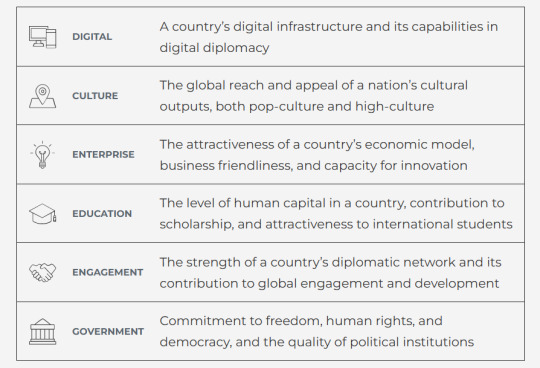
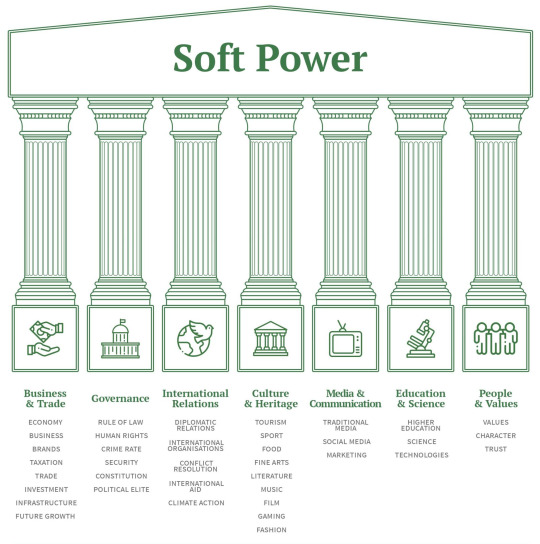
If you feel like all the above is still vague to the point of unparsable in an applied context, I spent the majority of the time researching how to demystify the term especially in the way MileApo discuss it, and found this great explainer:
A strong nation brand and positive soft power perceptions allow a nation to promote itself as a place for people to visit, invest in, and build a reputation for their quality of goods and services. [...] it is often overlooked that a strong nation brand and soft power can deliver better outcomes at home. Primarily it encourages domestic tourism, the consumption of domestic goods and services (rather than imports). Less tangibly it also just makes people feel better about their country.

Expressed in this context, soft power can be understood as the act of building trust in the cultural products of a nation domestically -- some more abstract in the form of art (music, film) and culture, some more concrete like products including fashion and beauty -- in a manner to appeal to its own citizens while also broadening the appeal of cultural goods abroad in a which can drive international tourism, trade, and commerce.
In other words: yes, our collective desire to actually taste Farmhouse bread.
The Thai government and the push for soft power
While my interest in this topic was originally piqued by MileApo's comments, soft power policy has to originate at the government level. Note again that Nye's definition of soft power is centered around "a country’s ability to influence", therefore soft power policy must always formally be expressed nationally.
Around the time MileApo consistently began promoting soft power in alignment with the period film, I noticed a slew of references in Bangkok Post, one of the reputable English online publications based in Thailand.
Back tracking through some of the articles as a reflection of national conversation, since 2020, there has been a consistent theme in terms of what the government is attempting and how well it's going (or not going):
On Thailand's soft power and positioning in the world, Feb 2020:
According to Kitti Prasirtsuk of Thammasat University, who has carried out extensive research into Thailand's branding and repositioning in the age of interconnectedness and social media, Thailand and its culture, values and foreign policy have charisma and high persuasive power which can attract admiration and cooperation. But the Thai people and bureaucrats must change their mindset and perceptions and appreciate their country in real terms first before they take up new challenges.
Within Asean, Thailand is behind Singapore as No.1 [among SE Asian soft power rankings]. The report stated that Thailand has the potential to rise into the top 30 in the world, if the country can strike the right political balance between the rural poor and urban elite. It went on to say that Thailand's weaknesses are problems related to corruption and inequality. It also said that the Thai government is failing to showcase the full potential of Thailand's rich cultural offerings beyond tourism. One more weak link is its poor performance in public diplomacy and digital infrastructure.
(Mile, Apo, and Bible all attended Thammasat University, which is considered one of the premiere universities in Thailand. Apo later transferred and graduated from a different university.)
On Milli, a Thai rapper who performed at Coachella in Spring 2022:
The presence of the 19-year-old rapper Milli at the Coachella Music Festival in the United States has reinvigorated Thailand's soft power ambitions -- an area the Thai government has not fully explored nor exploited. Milli, whose real name is Danupha Khanatheerakul, is the first solo Thai artist to perform at Coachella, a music festival that draws tens of thousands of fans annually.
[Milli's prescence at Coachella] was able to advance Thailand's soft power [in ways previously stalled]. It is not that the government is clueless about "soft power". For decades, governments have focused on presenting Thailand's soft power to the world. However, that iteration of "soft power" mainly consisted of Thai customs and traditions such as food, costume, classical dance, Buddhism rituals and the wai. These aspects of our cultural heritage, despite being charming to foreign tourists, are not sufficient to catapult Thailand's into a stronger position in the global market. Thai cultural heritage has failed to catch up in the digital age…
Milli's song also includes ideas relevant to international audiences. One of her songs openly discusses sexual consent. Being relevant is one of the keys to increasing the nation's presence among diverse populations. The cultural impact made by a young girl like Milli should make the government rethink its cultural promotion strategy. More support is needed for progressive Thai artists and innovators.
An opinion rebuttable on Milli's performance and the government's blundering of reaching for soft power while not meeting basic domestic requirements:
One of the minister's advisers belted out a long speech that did not seem to address how Thailand will become a "soft power" but used the term multiple times. One can't help but wonder if the ministry knows what it is doing, or what the so-called "soft power" it is espousing is about.
Milli's self-taunting line "I don't ride an elephant" may sound a bit old but her rapping about how "the country is good, people are good, our food is good but the government is bood," seems to have struck a chord. "Bood" means rotten in Thai. It is thus understandable if the government was not too coherent when discussing anything about the phenomenon that Milli created. Indeed, [Thailand's Prime Minister] Gen Prayut should feel awkward discussing the "soft power" of Milli and mango sticky rice when he filed a defamation charge against the teen rapper himself back in June last year.
Talented as Milli is, and extraordinary her achievements both locally and at one of the world's most famous music festivals have been, the teenage rapper really has nothing to do with so-called "soft power" which government figures are talking about. Her success is largely individual. Milli created a sensation and a craze. For Thailand's "soft power" to be built, let alone recognised globally, it takes more than one successful artist…
The whole product must be good if it is to exert influence. As experts argued, it takes a wide range of qualities for a country to say it has "soft power". These include the quality of its political institutions, education, digital development, innovation, cultural appeal, strength in arts or business brands. That is why it is odd for everyone to talk about Thailand's "soft power" now when we don't seem to have ticked any of the basic requirements.
On Bangkok International Fashion Week (BIFW):
BIFW2022 has been [a] major and continuing mission to promote and drive Thai fashion to international levels. The event strategically aligns with the government’s strategy to empower Thai fashion industry as fashion is one of the most influential soft power that stimulate economic growth.
Note that multiple actors in BOC walked BIFW2022 in September, as well as multiple actors from other Thai BL shows that aired in 2022.
On the increasing popularity of Thai BL:
Thai BL is now popular across Southeast and East Asia[, and] has been gaining traction in Japan, the home of BL, since 2020. Posters of famous khu jin were put up in a train station. Magazines that cover Thai drama, including BL, are rolled out for the Japanese audience. The Tourism Authority of Thailand has launched a Twitter account that uses BL to engage Japanese consumers. They are conducting research on these issues in the context of soft power.
Yes you read that correctly. No joke, BL as a facet of Thai soft power is so prevalent now that the government is literally tracking its popularity and Twitter conversation around the topic.
So what does this all mean?
Thailand is a country within Asia and internationally that has a lot of appeal as a tourism destination. However, with many competitor alternatives in both entertainment (particularly film and music) and beauty/fashion, which are major drivers soft power within Asia and internationally, and domestic dissidence of policy and politicians due to social conditions, Thai cultural power is not as prominent as it could be and also suffers at the international level.
While there is appeal of specific Thai cultural products internationally (such as Milli at Coachella or in the case of Kinnporsche the Series) the government has failed to activate these prominent media products as part of a cohesive soft power strategy.
However, the government does seem aware of the potential, specifically in the realm of BL. Thailand has always maintained an image of being LGBTQ-friendly among all the Asian countries, and may now be looking to push LGBTQ-aligned media (BL and GL dramas) specifically as part of its soft power strategy to increase pop culture and media appeal.
MileApo on Soft Power
Part of the reason my ears perked up at MileApo's consistent talking point of soft power is again, because even without a polisci background, I'm aware that soft power is expressed at the country policy level. Thus when both of them started specifically using the term to discuss the film in pre-production phase, it got my brain gears turning.
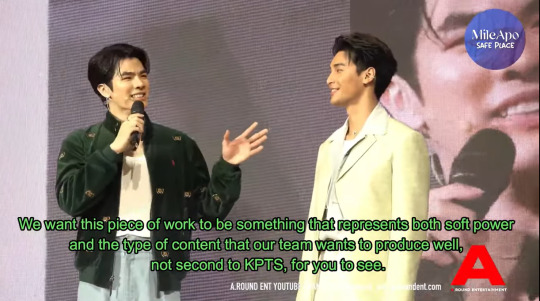
Mile talking about the film on 2022/9/24 at the D7 Grand Opening (vid/txt)

"Nong Po will act with Hia Mile -- please look forward to this movie next year, please look forward to that a lot. We want to expand Thai culture and soft power..." Apo on the Thai period movie at the KPWT Send off on 2022/9/11
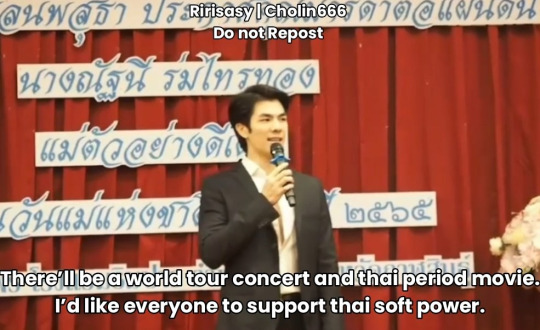
Mile Phakphum's speech on Mother's Day in Kalasin, 2022/8/5
Here's what we do know. Apo's dance training for the film is with a teacher affiliated with the academy that also produces dancers who specifically entertain the royal court.
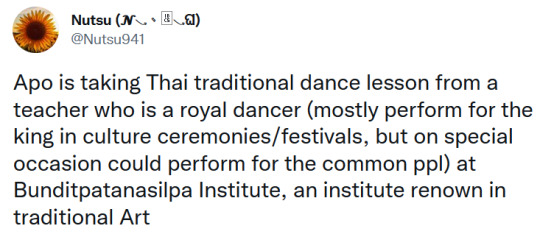
And here is what they individually said in the Vogue Thailand print interview (completed in late August 2022, published October 2022)
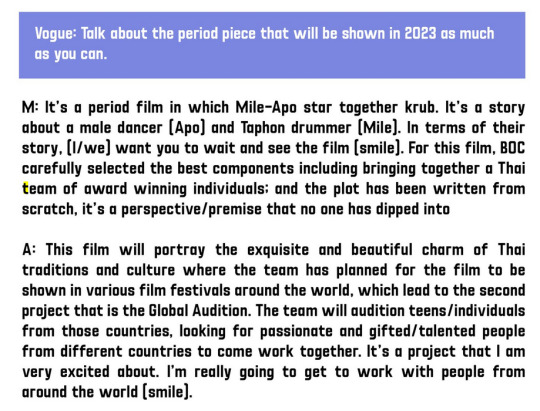
And I would be remiss and dishonest to not point out that Mile's family is prominent in Thailand and his mother is part of the Queen's inner circle. Keep in mind that Thailand is a constitutional monarchy where the monarch has limited powers in practice (think: Japan or UK), and Thailand has a history of cyclical political instability that does not displace the monarchy. So believe him when he says he has limited power compared to Kinn. He travels on a private citizen's passport like all the rest of the cast. (Though my eyes start watering when I'm thinking about baby chaebol CEO Mile and destiny.*)
That being said, what these connections likely did get the production team was access to cultural resources such as the dance expert and most likely credentialed historians to consult on the period film. I would surprised if there aren't ministers' offices who are in the loop about film's production in a way they would not pay to other film or show production teams. I'm sure we will find out more about the interesting and important people involved in the production process around the time the film is released.
Another aspect that stood out to me is the fact that Mile and Apo, neither of whom have policy backgrounds, started iterating the discussion point of soft power in a way you don't see Milli, or Mew Suppassit (who let's not forget was also a RSIFF invitee and the first Thai artist to break into the Billboard World Song Chart), talk about it. Mew actually has talked about soft power a couple of times, but only in the context that he is part of a cultural wave that can increase Thailand's influence globally and never specifically in relation to a project he is promoting. That speaks a lot to the team behind the scenes involved in the writing and consulting (and marketing) process of the 2023 historical film.
The timeline of when these comments popped up is also interesting. While they do coincide with the release of the trailer post KPWT Bangkok, most likely what's happening during this time period is that BOC and more specifically Mile is shopping for sponsors to the project.
Think about Mile speaking about Thailand soft power to an audience of mostly older businesspeople at the mother's day event -- what would the purpose be except an ask for partnership on a project that he is on, which can become a vehicle for Thai products both domestically and globally? Look at the timing of the announcement of the Srichand partnership (end of August), and how successfully that broken the brand into the lucrative Chinese market, moving millions of THB worth of product for a brand that had struggled to get any traction previously. While Srichand's focus is currently on China, working with a Thai beauty brand for a film where the trailer highlighted many historical makeup elements is an actually ideal brand partnership and project alignment.
(Sadly for us, I don't think the film will be the second longest bread commercial in existence. But based on the Farmhouse CEO's comments, I would be unsurprised if they signed on to support the film project too. Ancient Thai bread I guess *jazz hands*)
In Conclusion
MileApo's soft power talking point was an intentional move specifically to shop the film project around for sponsors. The Srichand partnership proved MA-as-a-brand's ability to move product in a lucrative, hard-to-crack foreign market, though Srichand (and Giffarine) as brands aren't necessarily able to stand in the market independently as of yet. Their past brand partnerships' success simultaneously showed how lucrative it is to book MA for a product domestically. I'm sure we'll see a slew of new interesting sponsors and brand partnerships this year. This is only the beginning of MA's power as a cultural brand domestically and internationally.
Mile and Apo have also expressed their pride in the past in being cultural ambassadors of Thailand, both at the RSIFF and when speaking about engaging tourists who are visiting Thailand. Their praise of Thai products (for example, the artistry of Thai silk in the Vogue Th Gala interview) and their active choice to work with mostly Thai brands speaks to their values as businessmen who genuinely want to uplift Thailand's influence in the global market.
That being said, the Thai cultural ministry cannot rely on a single cultural emissary to advance its soft power agenda globally, and as of right now, despite ...some attempts, a cohesive government strategy around soft power does not exist.
MileApo have demostrated their brand has strong impact, and that they can influence purchase behavior internationally (e.g., KPWT ticket sales, Srichand) in ways many Thai media figures have not been able to as of yet. But they are not formally tied to the Thai government, nor should the government intervene and attempt to direct artistic expression.
Culture is one aspect of soft power, and political/humanitarian expression is another major component that advances an international soft power agenda. There are already articles discussing Thailand's problems of political corruption and self/journalistic censorship due to political conditions that prevent full freedom of expression. But that's the government's problem to address that. There is a lot of unharvested potential in multiple realms.
This essay is not about that though. I'm just a fan.
Can it be December 2023 yet 🥺
Additional notes that don't fit into the essay under the cut:
(1) There was a lot of fandom hand-wringing in August and September about Apo publicly having working dinners with Pond over the film project. Let's not forget Mile is someone who cares deeply about the art he makes, and he and Apo both have said multiple times they talk almost nightly about their artistic intent. If Mile talks to Apo and Apo was talking to Pond, why would Mile, a person who cares deeply about art, not be talking to Pond in pre-production? Obviously the answer is a division of labor in the relationship: Mile was working on funding which is just as important, and Mile also needs to sleep and rest and not work. There wouldn't be anyone else he would trust to convey his artistic intent to the director except for Apo. True power couple behavior right there.
(2) * everyday I go feral over baby chaebol CEO Mile. If someone made a kdrama about a handsome chaebol baby who was a CEO but also an actor and model who met his soulmate in university but it was a missed connection and then the soulmate went on to become a famous actor/model who quit because of bullying, but then they met again when the baby chaebol WHO IS STILL A CEO BUT ALSO AN ACTOR met at an audition for a drama... *foams at mouth* I would call this show bizarre, nonsensical and incoherent, and yet HERE WE ARE IN REAL LIFE. The jetsetting supermodel with wealthy CEO part of reality which is now bending around MileApo so they can live their wattpad fanfic life. What the hell am I looking at, I ask myself every day.
(3) ** this statement does not include billionaires like Elon Musk or Jeff Bezos whose net worth exceeds those of small and mid-sized countries. Per today's estimate, ~50 people/families have more wealth than 90 of 190 countries. If your net worth can run the economy of half the countries in the world, then your wealth/resources hoarding behavior can control what the media says and influence otherwise free and fair elections.
Once again, Some of you need some contextualization of how comfortably wealthy vs. billionaire resource-hoarding rich looks like.
#mileapo#mile phakphum#apo nattawin#political science#soft power#international relations#thailand#thailand soft power#kinnporsche#mileapo 2023 film#if you like it give it a reblog#i spent so long on this#like twice as long researching as writing#if people don't like this one i'm gonna fr cry#business analysis#business#business case study#vogue thailand gala#vogue thailand#mileapo x vogue#kinnporsche meta#mileapo meta
601 notes
·
View notes
Text
Thailand Part 1
Thailand puts out so much BL it will have multiple polls. Sometime. Eventually.
#cherry magic thailand#bad buddy#my school president#1000 stars#moonlight chicken#not me the series#he's coming to me#midnight museum#the warp effect#theory of love#i bet y'all thought i forgot#i haven't forgotten i've just been busy#but i'm back to make you choose things#happy friday i am cruel
26 notes
·
View notes
Text



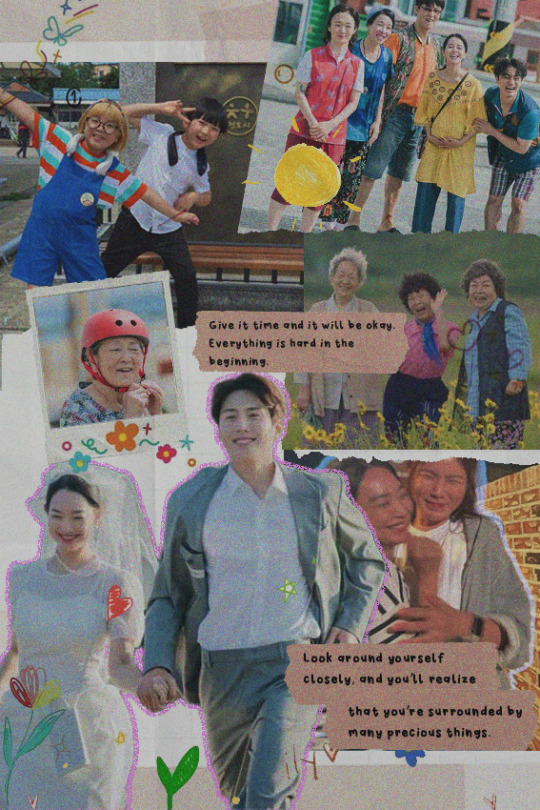


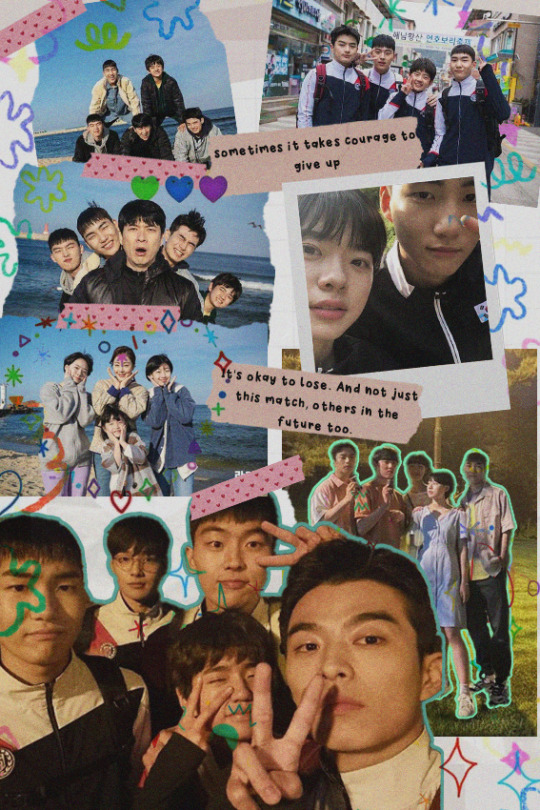



MY BEST 2022 RANKED DRAMAS
a little late but... Better later than Never
also watched:
Idol: The Coup 7.0
Now, We Are Breaking Up 3.5
My Roommate Is a Gumiho 7.5
Please Classmate 6.5
Rookie Cops 7.5
Snowdrop 7.5
You Are My Spring 6.0
My Mister 9.5
The Oath of Love 7.0
Sh**ting Stars 7.0
Green Mothers' Club 6.5
Why Her? 7.0
Forecasting Love and Weather 4.5
Our Blues 9.0
Dali and the Cocky Prince 7.0
Extraordinary Attorney Woo 8.0
May I Help You 8.0
Dropped: Love in contract
#kdramaedit#kdrama#korean drama#a business proposal#f4 thailand#falling into your smile#hometown cha cha cha#our beloved summer#tomorrow kdrama#vincenzo#tvn vincenzo#move to heaven#all of us are dead#racket boys#you are my hero#ahn hyo seop#sejeong#song joong ki#jeon yeo been#kim dami#choi woo shik#rowoon#lee soo hyuk#kim hee sun
240 notes
·
View notes
Photo




Marc Márquez interacting with the fans while waiting for the MotoGP race to start during the Thailand Grand Prix 2022.
#marc marquez#motogp#motogpedit#thailand gp 2022#bynadya#n.gif#have i told u i love him? no? perfect.#bc i really love him and im going to make it everyones business !!
286 notes
·
View notes
Text




Hi!!! I have opened my shop!!
The pre-order period will end on October 16 (utc+7)
For Thailand: order here
International order: here !
Thank you so much!!
#online store#i've been so. busy#these are all for a big comic event in thailand this nobember ans#i really outdid myself orz#anyway thank u all sm!!
26 notes
·
View notes
Text
blub blub 🫧🐠
#i dont know if i'll ever be able to travel#bc of money (i've never been able to afford it) nd even if i have a job someday nd can save up...#im not sure i'll have someone to go with. i can imagine going to like germany or norway on my own but not places further away#also like my anxiety... idk if i'll be able to w that. im so scared of flights nd airports lol#but ummm.. since i dont live in la la land im v aware that we are killing the earth at a rapid speed. thats real nd true#idk if im gnna have time to get a job nd save up before everything comes crashes down#i would love to at least travel to japan once! i rlly want that. also taiwan. vietnam. thailand. south korea...#idk why it's those countries so close to eo but i just rlly want to visit those countries. also the philippines (1/2 l's lol?)#ahhhh idk why im thinking abt traveling now when im busy being in pain#maybe it's bc one book im reading a woman nd her mom is on a trip to japan. nd im watching vlogs skksks#ughhh i hope i'll one day have the ability to at least travel once#japan is my dream trip T-T
12 notes
·
View notes
Text
youtube
happy happy happy birthday sayo ang inumin sayo ang pulutan 🎉🎂
#hws philippines#hetalia#hws asean#hws indonesia#hws vietnam#hws malaysia#hws thailand#hws singapore#aph philippines#aph indonesia#aph vietnam#aph malaysia#aph thailand#aph singapore#aph asean#HAPPY BIRTHDAY PIRI I WANT TO KISS YOUR PUSS........ PUSO YEAAAAYUHHHHHHH#I lob him I want to eat him whole#Also haven't uploaded anyth here teehee I was busy enjoy this new video#Animation#snail's house#Kanae asaba#Youtube
42 notes
·
View notes
Text
Haven’t felt this sad about a show ending since f4 and business proposal honestly
#only friends#only friends the series#ofts#f4 thailand#business proposal#which is saying a lot#bc they had such a chokehold on me
9 notes
·
View notes